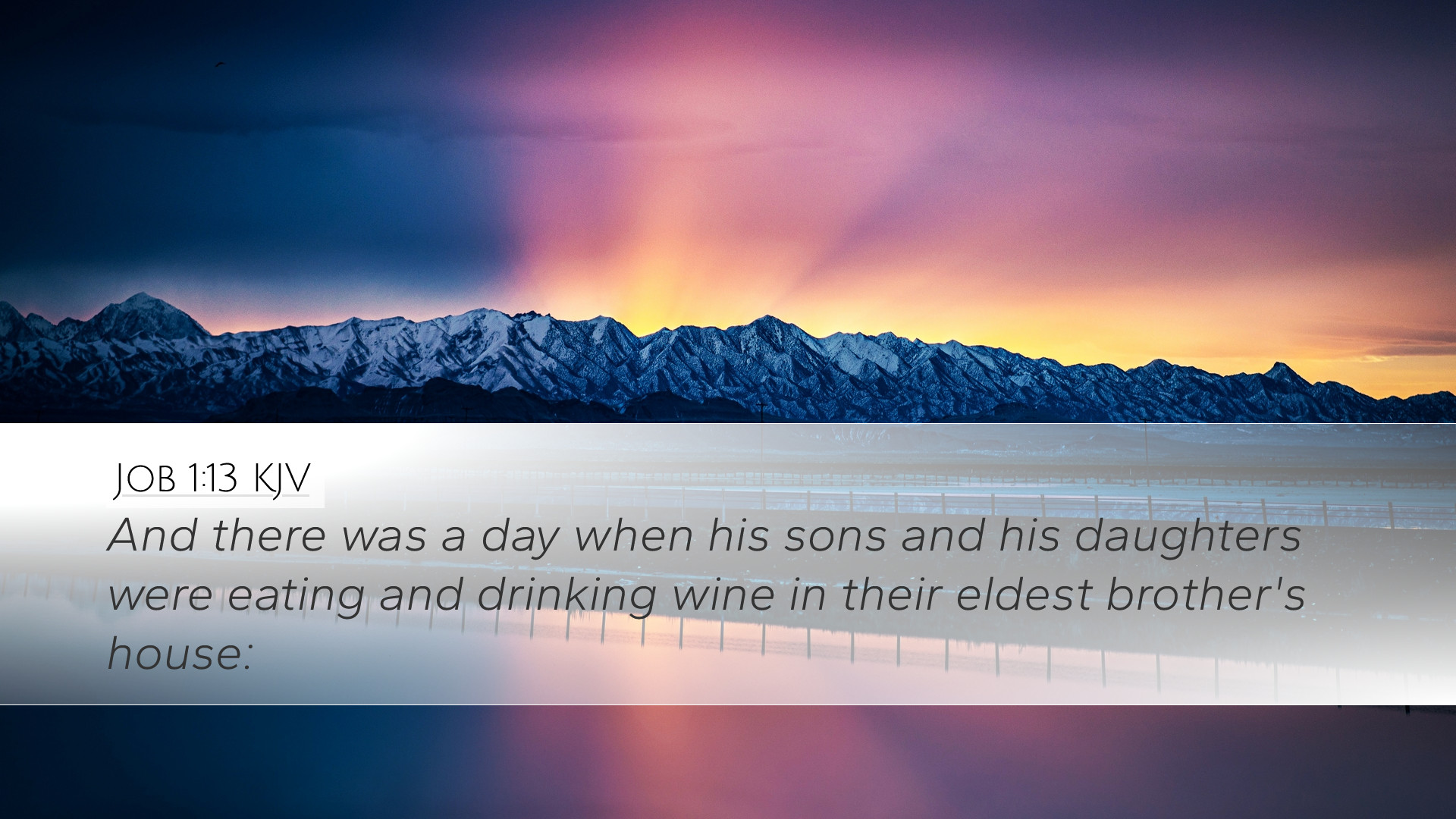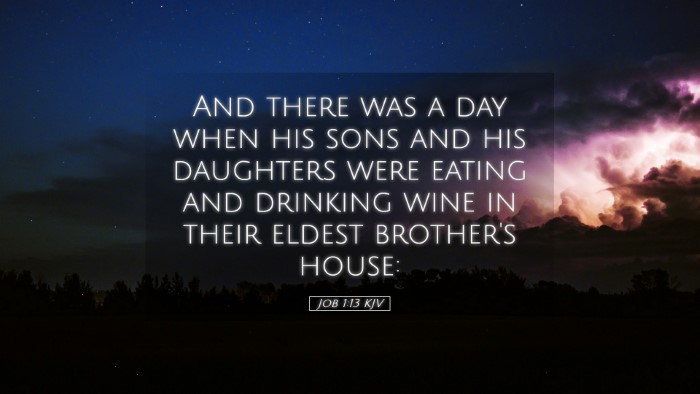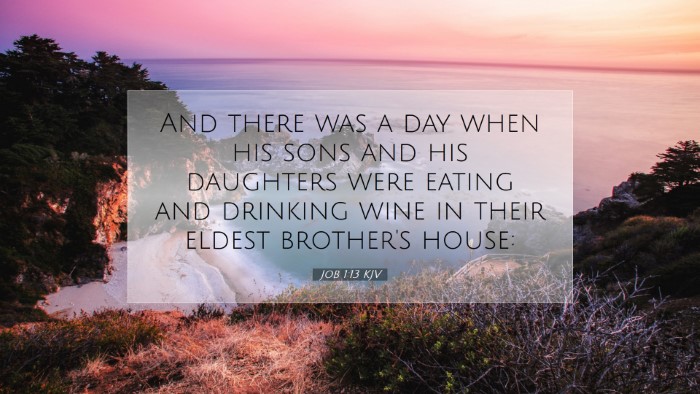Old Testament
Genesis Exodus Leviticus Numbers Deuteronomy Joshua Judges Ruth 1 Samuel 2 Samuel 1 Kings 2 Kings 1 Chronicles 2 Chronicles Ezra Nehemiah Esther Job Psalms Proverbs Ecclesiastes Song of Solomon Isaiah Jeremiah Lamentations Ezekiel Daniel Hosea Joel Amos Obadiah Jonah Micah Nahum Habakkuk Zephaniah Haggai Zechariah MalachiJob 1:13
Job 1:13 KJV
And there was a day when his sons and his daughters were eating and drinking wine in their eldest brother's house:
Job 1:13 Bible Commentary
Commentary on Job 1:13
Verse: Job 1:13 - "And there was a day when his sons and his daughters were eating and drinking wine in their eldest brother's house."
Contextual Overview
This verse sets the stage for the trials that Job will encounter, amidst a backdrop of familial activity and social gathering. It depicts a moment of normalcy in Job's life, displaying the interaction of his family in a celebratory atmosphere.
Insights from Public Domain Commentaries
Matthew Henry
Matthew Henry highlights the significance of this verse in Job’s life and the dangers of prosperity. He notes that Job's children were in a time of revelry, illustrating that celebrations, while good, can sometimes lead to careless behavior. Henry points out that Job, characterized by his piety and righteousness, felt the need to offer sacrifices on their behalf, indicating his deep concern for their spiritual state.
- Family Dynamics: Henry emphasizes the importance of family unity, as Job’s children gathered in the elder brother's house, depicting a strong familial bond.
- Awareness of Sin: Henry interprets Job’s actions post-feasting as indicative of his awareness of potential sin among his children, underscoring a parent's responsibility to intercede for their children.
Albert Barnes
Albert Barnes provides further analysis by reflecting on the tranquility that Job experienced before his calamity. He observes that this verse introduces a peaceful moment in Job’s life, where his children are enjoying themselves, which starkly contrasts the upheaval that follows. Barnes also delineates the cultural practices surrounding feasting and drinking in ancient times, showing how these gatherings were often laden with both joy and potential moral pitfalls.
- Hedonistic Trends: Barnes notes that while celebration is not inherently sinful, it can lead to excess and spiritual neglect, urging believers to maintain vigilance in times of joy.
- Job’s Righteousness: His proactive approach to offering burnt offerings reflects his duty as a righteous man, caring deeply for the souls of his children amid joyful gatherings.
Adam Clarke
Adam Clarke focuses on the specific details within the verse, providing cultural insights. He comments on the feasts held by the children of Job, reflecting on the custom of important events such as birthdays and family gatherings as occasions for communal drinking. Clarke raises the question of whether such feasting could lead to imprudence but ultimately concludes that the festivities themselves were not sinful, provided they were approached in moderation.
- Divine Intervention: Clarke discusses the notion of divine oversight, suggesting that such familial activities occur under the watchful eye of God, who is aware of the moral integrity of those involved.
- Preparatory Trials: The gathering in the verse is viewed as a prelude to Job's tragic trials, hinting that moments of joy may often precede significant spiritual challenges.
Theological Implications
From the perspectives of Henry, Barnes, and Clarke, we discern that the gathering described in Job 1:13 serves multiple theological purposes:
- The Nature of Human Joy: It reveals that human beings can find joy in family and societal interactions, yet it is crucial to remain anchored in faith and virtue amid such celebrations.
- Parental Responsibility: The emphasis on Job's sacrifices reflects the continuous need for vigilance in spiritual leadership within families.
- God’s Sovereignty: The abrupt introduction of calamity following a peaceful moment reminds the reader of Job’s vulnerability and the ultimate control of God over humanity’s circumstances.
Application for Today’s Believers
Diving into Job 1:13 encourages believers to reflect on their own lives and the environment in which they raise their families. There remains a duality between blessing and trial, calling for continuous prayer, reflection, and dedication to spiritual disciplines even in moments of joy.
Additionally, the verse reminds congregants to engage in communal activities with an attitude of self-awareness and humility. Celebrating God’s blessings should be accompanied by a sincere heart seeking to honor Him in all aspects of life.
Conclusion
Job 1:13 encapsulates ordinary life as experienced by Job and his family, setting the narrative stage for the profound grief and testing to come. Through insights from classical commentaries, contemporary readers can glean wisdom on family dynamics, spiritual vigilance, and the overarching providence of God that governs all human experience.


